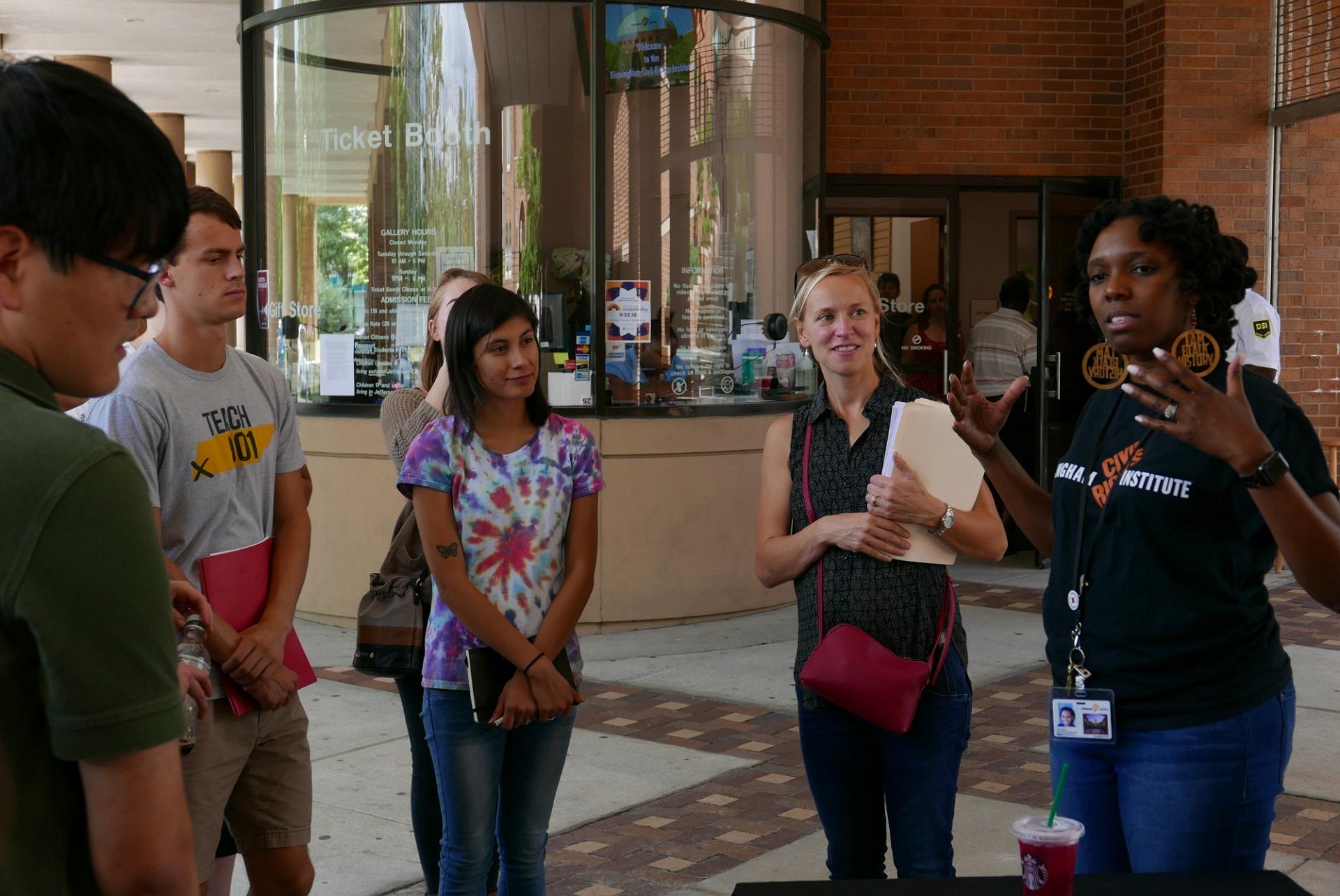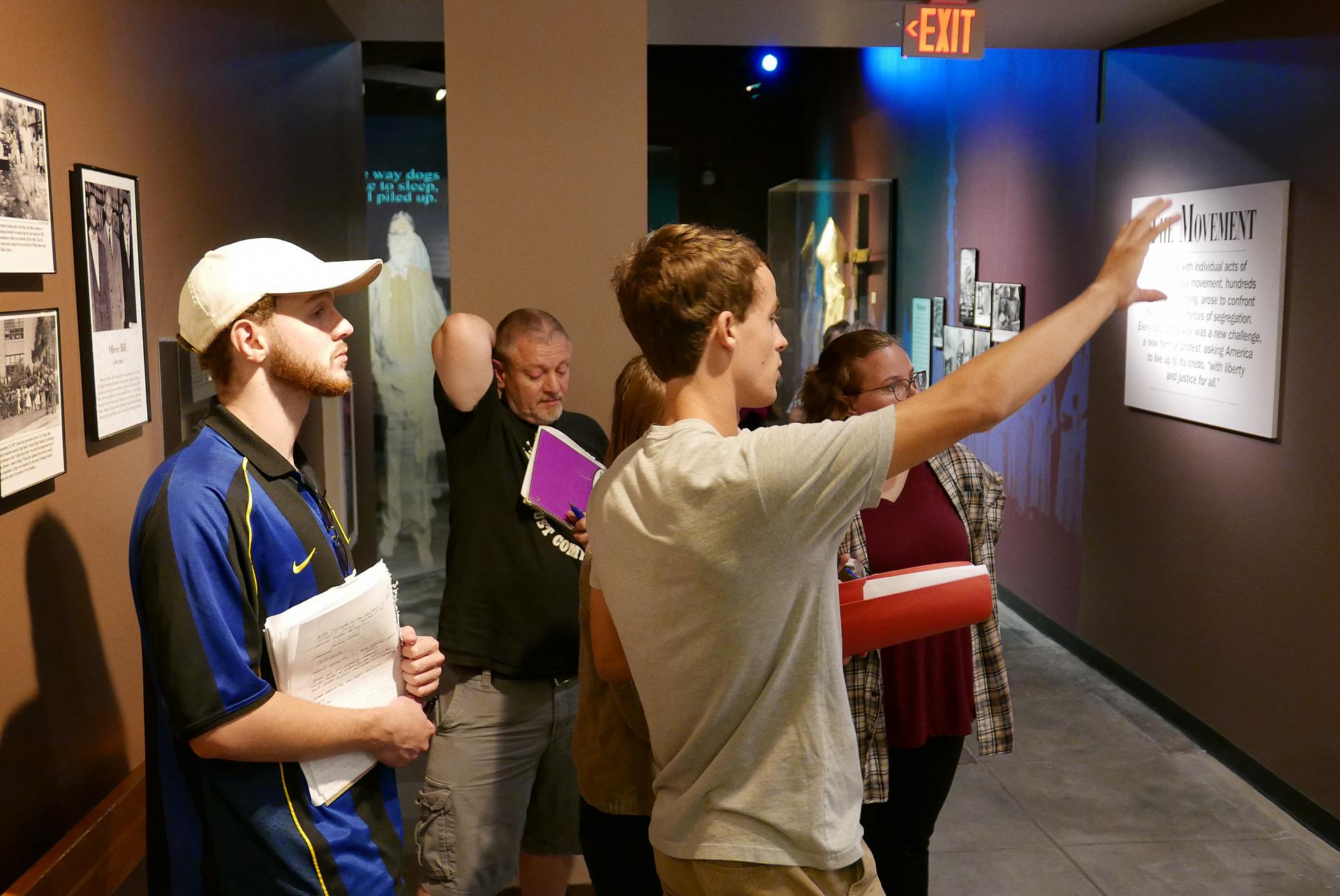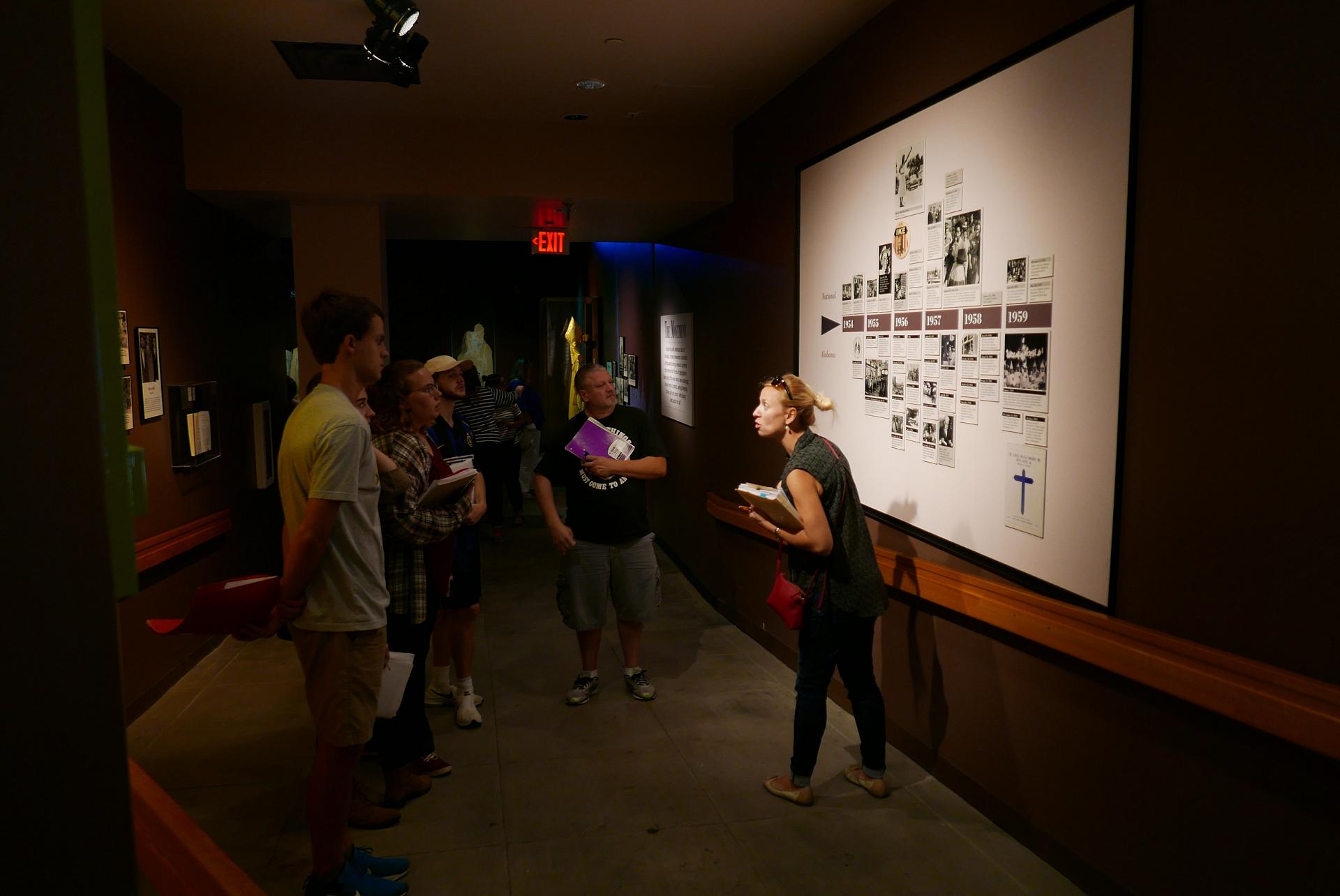Susan Eckelmann Berghel
Spotlighting Teaching Innovation at UTC
The Walker Center’s “On the Cutting Edge” is an occasional essay series by UTC faculty spotlighting teaching innovation across the UTC campus. Interested faculty are encouraged to explore WCTL’s Innovation Grants webpage and Experiential Learning Resources through ThinkAchieve: Beyond the Classroom for teaching innovation support. Note: The next Teaching and Learning grant deadlines are November 1 and December 2.
Engaging the Civil Rights Movement: Birmingham Trip and Portable Exhibit

Today, we feature Dr. Susan Eckelmann Berghel of the History Department and the Africana Studies program who writes about an experiential learning activity that involved students from HIST 3475: The Modern Civil Rights Struggle. The class visited the Birmingham Civil Rights Institute and applied their experience to develop a local exhibit on the civil rights movement in Chattanooga. The field trip to the museum invited students to consider how scholarly research informs public history and current issues. Dr. Eckelmann Berghel has also taken trips to Spelmann College and involved K-12 students as a part of this and other classes, including HIST 4550: African American Women, which is designated as Experiential Learning.

The Innovation: What motivated your teaching experiment and what specific practice did you bring to your class?
Over the past four years, I have worked with a network of local community partners, including the Hunter Museum, the Mayor’s Council for Women, the Chattanooga Public Library, the Creative Discovery Museum, and regional universities to provide students with experiential learning opportunities, to make local history more accessible, and to highlight untold stories. My students have participated in oral history projects on the Cold War and African American women in Chattanooga and the creation of children’s narratives addressing historical themes and racial diversity. The field trip to the Birmingham Civil Rights Institute and the students’ local history exhibit that followed on this visit built on and broadened previous classroom practices.
My own research experience and enthusiasm for archival work informed the development of this assignment. The learning activity represents an ongoing effort to demystify the process of historical research, to illuminate public historians’ role in cultivating an informed and invested citizenry, and to connect UTC students with the Chattanooga community.

Student Reaction: How did your students respond to the innovation? Were they open? Was there any resistance? What improvements did you notice in their learning?
During the field trip, UTC Special Collections director Carolyn Runyon, UTC Studio director Emily Thompson, and I helped students identify, study, and unpack valuable exhibit components at the Birmingham Civil Rights Institute. Following the field trip, I asked students to comment on the effectiveness of specific exhibit displays by detailing what made them historically significant and educational and how they intended to apply these insights to their exhibition project.
One student reflected upon the experiential learning experience: “This trip was crucial in the organization and production of our historical exhibit project. We took photos and notes on how their exhibits were laid out and the commentary that their exhibits provided and based our own commentary off of their examples. It gave us an idea of what would attract an audience’s eye, and allowed us to focus on that aspect, which we are not used to.”
Another student explained, “The experience of touring the institute served as a source of inspiration when creating the historical exhibit on Chattanooga’s civil rights movement. … I found the inclusion of overlooked moments to be particularly compelling as it brought back into awareness many events and individuals that might have otherwise been forgotten. In constructing an exhibit over youth activism in Chattanooga during the civil rights movement, our group hoped to do the same. We recognized that the museum made use of a variety of mediums, such as artifacts, newspapers, maps, images, film and audio, to recount historical events. Drawing on the inventiveness of the museum, we used a combination of newspaper articles and images provided by Special Collections alongside our written narrative to tell the important story of the young civil rights activists that helped shape Chattanooga’s local movement.”
Following the museum visit, students applied their insights during the research and design stage of their own historical exhibit displays on Chattanooga’s civil rights history when (1) identifying and engaging primary sources critically, (2) incorporating secondary literature, and (3) interpreting materials and drafting a complete exhibit narrative that targets a broader public audience. By presenting historical research and a critical understanding of Chattanooga's civil rights past in an exhibit display, students translated the experiential learning activity into public history practices. Students' blogposts highlighted their research experiences that led to the creation of the historical exhibit.
The reception of the exhibit that followed in the spring (after the semester and the class had ended) was a critical component of the assignment’s success and, ultimately, students’ fuller understanding of the assignment’s broader impact. Students saw their exhibits on display and in the Q&A with a public audience had to explain the significance of the public exhibit and experience as a whole. Student panelists pointed out that they found archival research and the process of developing the exhibit challenging. Hearing visitors engage with and appreciate their work illustrated to them the value of public history—a lesson outcome they did not anticipate when completing the actual research work and organization of the panels. For more on students’ reflections, read the UTC Blog about the exhibit reception.
While many students were open to this learning activity, some also expressed their struggle with the demands of archival research and management of project deadlines.

The Future: Will you continue using this innovation in the future? Are there any modifications that you will make?
Definitely! All my classes, from General Education survey courses to research-intensive seminars, incorporate a degree of innovative and experiential learning.
With this specific assignment, I intend to modify a few components. In the 1.0 version of the assignment, I missed important opportunities to educate students about the restrictive use of archival materials and particulars of navigating archival spaces. Next time, I would explain the time-consuming nature of reviewing and identifying sources to answer a broader question. Importantly, I would present them with examples that illustrate the possibilities of public history.
In the age of Google.com, students are used to doing “couch-research” with information that is available at their fingertips. Archival research allows students to visualize what a digital database might look like on a smaller scale in its physical form. It is through archival vetting of extensive repositories, where students learn to identify, organize, and curate documents and information. In the future, I’d be more intentional about teaching students time management. I would stress the challenges and benefits of teamwork, add a formal publication component, and connect with other community partners for additional opportunities to showcase students’ exhibit.

Experiential Learning: What value do you see in experiential learning? Do you have any advice for a colleague who might be skeptical about such innovations?
Most students recognize the importance of learning beyond an assignment and a semester. They learn to solve problems or complete tasks that require a range of different skillsets. At its best, applied-learning demands a degree of humility (from faculty and students alike) and a willingness to invest in a project beyond its formal deadlines and intended course outcomes. Experiential learning allows students to hone their ability to work in teams and develop a range of skillsets.
My two cents for faculty who shy away from experiential learning:
Learning beyond the classroom is manageable, especially when planning ahead and collaborating with others. Importantly, the activity or assignment doesn’t have to be perfect on the first attempt. On that score, experiential learning activities offer other valuable lessons, including the possibility of failure (and how to process and move on from it) and the challenges of teamwork and time-consuming projects (and how to overcome these challenges). Navigating these potential obstacles during experiential learning activities promise to better prepare students for the demands of today’s professional world.
My advice to students who remain skeptical:
Teamwork is tough, and, yet, most jobs require a degree of collaboration. Effective teamwork and communication need to be rehearsed. College is a laboratory where you can hone these skills without the high stakes an actual job presents.
Most projects, especially those with lasting and meaningful outcomes, require time and investment beyond a semester or 4-year college degree. Most project deadlines exceed academic frameworks. Complete work because it means something, not simply because it has deadline.
Trust your professors (a bit more). They may not always get the assignment perfect, but their best intentions are an investment in your education and your ability to succeed well beyond finals. That’s a gift that will bring dividends in years to come.